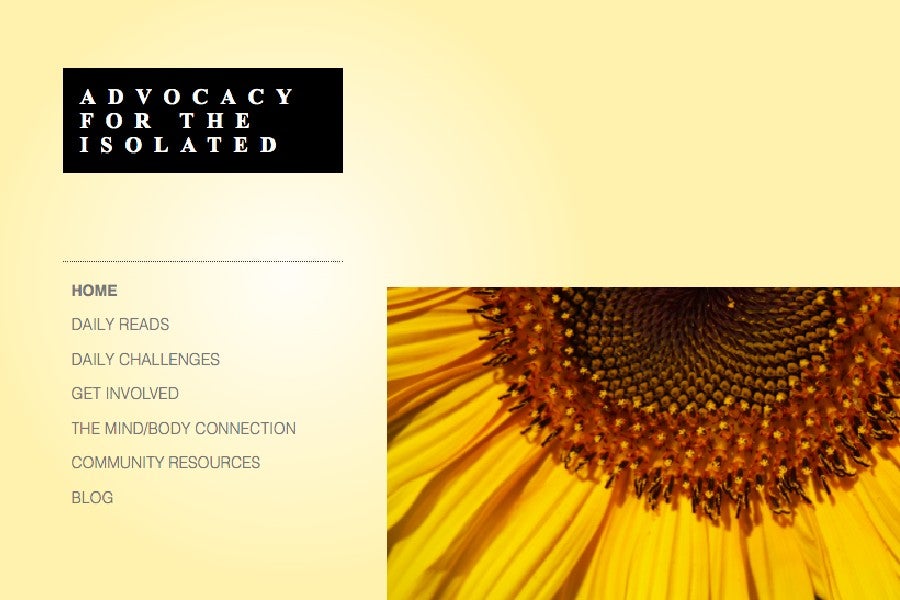Advocacy for Isolated created out of student project in response to effects of COVID-19
Lipscomb students are leading the way in developing resources to help others during the COVID-19 pandemic.
Kim Chaudoin |

As millions of people across the nation have sheltered-in-place at home for six or more weeks to fight the spread of the COVID-19 virus, the isolation created by working from home, taking classes in a remote format, stay-at-home orders and limited physical interaction with others has led to other concerns such as depression, loneliness, suicidal thoughts and other mental health issues.
When Denis’ Thomas, associate professor of psychology, assigned graduate students in her Introduction to Mental Health Counseling course the task of starting or completing an advocacy project at the beginning of the semester, she nor her students could have possibly imagined that a few short weeks later a worldwide pandemic would virtually send the majority of the world’s population into their homes for months to stave off the spread of the virus.
As students were grappling with the project, Audrey Jean Jones, Jennifer Knowles and Christina Rumbaugh, all first-year students pursuing Master of Science degrees in clinical mental health counseling, turned to their personal experiences during this unique time in the world for ideas.
“At the time when considering what I wanted to do as a project, my resources were limited as businesses and schools began closing due to the COVID-19 outbreak. I had been in isolation for about seven days and noticed the toll isolation takes on our mental health and well-being,” said Jones, of Temecula, California. “I began to reach out to other friends and family in isolation and learned that I was not alone in the feelings of being down. Based on my interactions, I wanted to help create a solution to help boost mental health and wellness during a time of uncertainty and crisis.”
Classmates join together
Jones began thinking about developing an online resource, but had some technical questions and issues. She reached out to other students in her cohort asking for help, and she found the ideal resource in Knowles, who is a web designer, graphic designer and content creator for several B2B and nonprofits in Nashville. Knowles offered to customize the website template Jones had already chosen and added some functionality along with content development.

Christina Rumbaugh
I think that a lot of people recognize the need for social isolation and quarantining right now, but I'm not sure most people realized how difficult it would be. As a person who is isolating alone, I had no idea of the strain it would have on me mentally and physically. — Christina Rumbaugh, Nashville
The project also caught Rumbaugh’s attention. With a background in journalism, she works in marketing where she has deep expertise in content development and management and has written for several blogs over the years. Combined with her passion for mental health, Rumbaugh, of Nashville, was eager to assist in developing content for the site. With the visionary for the initiative, the technical guru and the writer in place, the team had the needed resources to move forward with the project.
The impact of isolation
They each have an acute understanding of the impact of isolation on mental health in particular during the COVID-19 outbreak.
“I think that a lot of people recognize the need for social isolation and quarantining right now, but I'm not sure most people realized how difficult it would be,” acknowledges Rumbaugh. “As a person who is isolating alone, I had no idea of the strain it would have on me mentally and physically. I think a lot of people, especially people who are thinking to themselves ‘but I'm an introvert; don't I live for this?,’ are realizing just how important a sense of community is for mental wellbeing.”
Knowles says that relationships are one of the foundational needs that every human requires for that mental wellbeing.
“Next to having our basic physical needs met, relationship and belonging may be one of the more important components of achieving emotional wellness,” she says. “When we are separated from connection with others, we may see higher levels of anxiety, depression, and possibly even suicide.”
Isolation also raises concern for physical health as well, according to Jones. As individuals slow down and not leave their homes, the momentum they build for themselves to stay physically active decreases significantly which is a major contributing factor to psychological distress.
A topic the world can relate to
All three believe firmly that it is important to talk about isolation and to be aware of its impact on oneself and those around them.
“Isolation is the one thing that most people worldwide can relate to at this very moment. Awareness is important because this is the foundation for building a new community. I am a person that believes, community can ensure survival,” says Jones. “This isolation can serve as a bonding point for individuals, creating connections that can save someone’s life.”
Because the stress of isolation can take its toll in so many ways, Rumbaugh believes it's important to collectively remember and think about those among us who may be isolated.
“This current pandemic is a stressful time for everyone and it may come in unexpected ways. One way that I've noticed is this false idea that we have to be using this time to be productive and creative. Unfortunately, that's not how it works for everyone,” she explains. “With the prevalence of social media, with its influencers and content creators, its faux-motivational messages about learning new skills during this ‘free’ time can put undue pressure on people who are already in fight-or-flight mode (hint: all of us are).”

Audrey Jean Jones
Isolation is the one thing that most people worldwide can relate to at this very moment. Awareness is important because this is the foundation for building a new community. I am a person that believes, community can ensure survival. This isolation can serve as a bonding point for individuals, creating connections that can save someone’s life. — Audrey Jean Jones, Temecula, California
For those who are isolated, who may not talk to another person for days at a time, it is important to maintain some sort of connection to the outside world. Rumbaugh says, “Until we can enjoy a sense of physical togetherness again, all we have are texts, phone calls, and video calls. It's not the same, but it's vital to keep us all together.”
Knowles believes it is important to be aware of those who may be isolated and to be intentional about reaching out to them consistently.
“We often get so busy managing our own lives and emotions that the friend or family member who is slipping into disconnection and loneliness may go unnoticed,” says Knowles, of Nashville. “Chronic social isolation can take a significant toll on our bodies and minds. Isolation and loneliness are associated with increased sympathetic nervous system activity, increased inflammation, and decreased sleep, all of which can accelerate brain and cardiovascular aging. Loneliness and social isolation are also associated with increased blood pressure, higher cholesterol levels, anxiety, depression and even decreases in cognitive abilities and Alzheimer's disease. On the most basic level, we should be aware because we care about the health and wellbeing of those around us.”
Jones says her passion for experiencing joy and helping others to feel the same, even in what may seem like joyless times, is a driving force on this project.
“The COVID-19 outbreak created a lot of chaos for people in such a short period of time and I am passionate about helping others understand that while the time may be dark and stormy, there are breaks in the rain clouds that we can use to make this experience one to look back on and smile about,” she encourages. “In this exact moment, we are making history and I hope others can adopt a positive lens to look through and see what good does come from this time.”

Jennifer Knowles
We often get so busy managing our own lives and emotions that the friend or family member who is slipping into disconnection and loneliness may go unnoticed. Chronic social isolation can take a significant toll on our bodies and minds. — Jennifer Knowles, Nashville
Rumbaugh adds that caring for one’s mental health is important under normal circumstances, but is particularly important in a time of crisis.”During times of global stress, I believe it's even more important to remind people that we can still be together alone.”
“No one has to be left behind. Our isolation situations may look different — and some of our jobs may preclude us from isolation while inviting other risks — but we are facing a similar mental strain and people need to remember that our mental states matter,” she says. “It's important to take care of each other, but like the oxygen masks that drop down on a plane, it's just as important to put our own on first before we assist others.”
Building a resource to help
The trio put their various talents to work building a website as a free resource to those who may be struggling with isolation or know of someone who is. The result? The Advocacy for the Isolated website — advocacyforisolated.org.
advocacyforisolated.org is a blog and article-based website that covers topics including mental health, covid-related issues, good news, public resources, and ideas for increased wellbeing for all people but especially those affected by isolation. In addition, daily challenges are listed on the website specifically geared towards boosting mental health and finding happiness.
“All of the challenges posted are ones that I have done for myself just to make sure it really is a mood booster! For instance, reorganizing spaces. For a week, I dedicated time to reorganizing my closets because they were a mess. Since completing that challenge, I have had so many lingering feelings of accomplishment that bring a smile to my face whenever I walk in the fresh space,” Jones admits.
A lasting impact
Jones says she hopes advocacyforisolated.org is a helpful resource for a long time to come.
“I hope this resource continues to grow and establish a community that people can turn to knowing they can find a place to ease the tension brought on by isolation and the pandemic,” she says. “I hope this resource is educational and fun and that people come to it feeling like they are getting a breath of fresh air.”
Rumbaugh says she hopes the website and resources provided will bring some comfort to those who are feeling isolated, stressed and alone. “I wanted to be involved to sort of put a voice to those feelings so people could feel existentially less alone even if they have to be physically alone,” she says.
“The problem is that we aren't wired for this kind of long term social disconnection,” Knowles adds. “The effects of social distancing may look like sleeping more than usual or overeating for some or it may look like reverting to maladaptive behaviors, leaning on substance abuse or self-harming for others. Some people may be in homes where they feel unsafe.”
“It's important to me to connect with those people, to be a voice of encouragement, to provide relevant and helpful information. Most importantly, to start a conversation that includes all voices and offers all people a chance to find connection,” she continues. “That's why the blog format works so well, you can comment and connect with others on every page. I encourage that people reach out to some of the free mental health resources listed on our blog. We'll add to the list as we learn more about what's out there. No matter is too small when it comes to your wellbeing.”
Lipscomb University offers a Master of Science degree in clinical mental health counseling. With curriculum built around licensure expectations and a 100 percent pass rate, students are prepared to excel. The program is the first faith-based, CACREP accredited program in Tennessee to arrive at the intersection of caring and competent. For more information, visit www.lipscomb.edu/academics/programs/clinical-mental-health-counseling.